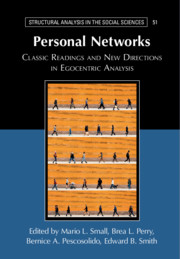Book contents
- Personal Networks
- Structural Analysis in the Social Sciences
- Personal Networks
- Copyright page
- Contents
- Figures
- Tables
- Contributors
- I Background
- II Early Foundations
- 1 From Georg Simmel, “On the Significance of Numbers for Social Life: Introduction,” “The Isolated Individual and the Dyad,” “The Triad,” and “The Web of Group Affiliations”
- Georg Simmel’s Contribution to Social Network Research
- 2 From Elihu Katz and Paul F. Lazarsfeld, Personal Influence
- Influencers, Backfire Effects, and the Power of the Periphery
- 3 From J. Clyde Mitchell, “The Concept and Use of Social Networks”
- On J. Clyde Mitchell’s “The Concept and Use of Social Networks”
- 4 From Elizabeth Bott, “Urban Families: Conjugal Roles and Social Networks”
- Commentary on Bott’s “Family and Social Network”
- 5 From Leon Festinger, Stanley Schachter, and Kurt Back, Social Pressures in Informal Groups
- Festinger, Schachter, and Back’s Social Pressures in Informal Groups
- 6 From H. Russell Bernard, Peter Killworth, David Kronenfeld, and Lee Sailer, “The Problem of Informant Accuracy”
- Implications of Informant Accuracy Research for Ego Networks
- 7 From Harrison C. White, Identity and Control
- On Parachutes and Lion-Taming
- III Later Foundations
- IV New Perspectives
- Index
- Recent Books in the Series
- References
5 - From Leon Festinger, Stanley Schachter, and Kurt Back, Social Pressures in Informal Groups
from II - Early Foundations
Published online by Cambridge University Press: 01 October 2021
- Personal Networks
- Structural Analysis in the Social Sciences
- Personal Networks
- Copyright page
- Contents
- Figures
- Tables
- Contributors
- I Background
- II Early Foundations
- 1 From Georg Simmel, “On the Significance of Numbers for Social Life: Introduction,” “The Isolated Individual and the Dyad,” “The Triad,” and “The Web of Group Affiliations”
- Georg Simmel’s Contribution to Social Network Research
- 2 From Elihu Katz and Paul F. Lazarsfeld, Personal Influence
- Influencers, Backfire Effects, and the Power of the Periphery
- 3 From J. Clyde Mitchell, “The Concept and Use of Social Networks”
- On J. Clyde Mitchell’s “The Concept and Use of Social Networks”
- 4 From Elizabeth Bott, “Urban Families: Conjugal Roles and Social Networks”
- Commentary on Bott’s “Family and Social Network”
- 5 From Leon Festinger, Stanley Schachter, and Kurt Back, Social Pressures in Informal Groups
- Festinger, Schachter, and Back’s Social Pressures in Informal Groups
- 6 From H. Russell Bernard, Peter Killworth, David Kronenfeld, and Lee Sailer, “The Problem of Informant Accuracy”
- Implications of Informant Accuracy Research for Ego Networks
- 7 From Harrison C. White, Identity and Control
- On Parachutes and Lion-Taming
- III Later Foundations
- IV New Perspectives
- Index
- Recent Books in the Series
- References
Summary
Festinger, Schachter, and Back’s Social Pressures in Informal Groups (henceforward FSB’s SPIG) was one of the most exciting and theoretically generative works in what we now think of as the field of social networks, emerging from one of the focal arenas of Gestalt-psychology-inspired research. It established the importance of functional distance for relationship formation, and demonstrated that there were effects of variations on the scale of feet, not miles. It also used a clever research design to attempt to see if information spread along social networks. The clarity of FSB’s structuralist vision was to some degree clouded by the then-common reification of groups, and a tendency to focus on normative and functional goals to the exclusion of all else. Yet here were many of the seeds of the structural approach to social networks.
Keywords
- Type
- Chapter
- Information
- Personal NetworksClassic Readings and New Directions in Egocentric Analysis, pp. 135 - 150Publisher: Cambridge University PressPrint publication year: 2021
References
- 1
- Cited by

